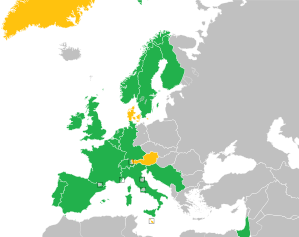Eurovision Song Contest 1973
| Eurovision Song Contest 1973 | |
|---|---|
 |
|
| Dates | |
| Final | 7 April 1973 |
| Host | |
| Venue |
Grand Théâtre Luxembourg City, Luxembourg |
| Presenter(s) | Helga Guitton |
| Conductor | Pierre Cao |
| Executive supervisor | Clifford Brown |
| Host broadcaster | Compagnie Luxembourgeoise de Télédiffusion (CLT) |
| Interval act | Charlie Rivel |
| Participants | |
| Number of entries | 17 |
| Debuting countries |
|
| Returning countries | None |
| Withdrawing countries | |
| Vote | |
| Voting system | Two jury members from each country, with each of them awarding between 1 and 5 points for each song. |
| Nul points | None |
| Winning song |
"Tu te reconnaîtras" |
The Eurovision Song Contest 1973 was the 18th edition of the annual Eurovision Song Contest. It was held in Luxembourg. It was won by the Luxembourg entry, "Tu te reconnaîtras", this being Luxembourg's fourth win. The voting was a very close one, with Spain finishing only 4 points behind and Cliff Richard of the United Kingdom (who came second in 1968) another 2 points after. The winning song scored the highest score ever achieved in Eurovision under any voting format, recording 129 points out of a possible 160; scoring just under 81% of the possible maximum, but partly due to a scoring system which guaranteed all countries at least two points from each other country.
The city of Luxembourg, also known as Luxembourg City, is a commune with city status, and the capital of the Grand Duchy of Luxembourg. It is located at the confluence of the Alzette and Pétrusse Rivers in southern Luxembourg. The city contains the historic Luxembourg Castle, established by the Franks in the Early Middle Ages, around which a settlement developed.
The Grand Théâtre de Luxembourg, inaugurated in 1964 as the Théâtre Municipal de la Ville de Luxembourg, became the venue for the 1973 contest. It is the city's major venue for drama, opera and ballet.
The language rule forcing countries to enter songs sung in any of their national languages was dropped, so performers from some countries sang in English. The event was marked by controversy when the Spanish song, "Eres tú" (by Mocedades), was accused of plagiarism due to reasonable similarities in the melody with the Yugoslav entry from the 1966 contest ("Brez besed" sung by Berta Ambrož); however, "Eres tú" was not disqualified. After finishing second in the contest, the song went on to become a huge international hit.
...
Wikipedia


